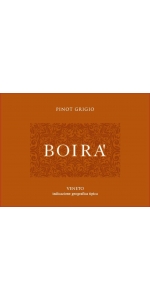Wine from Cantine Volpi
Founded in Tortona, in the Province of Alessandria in the far-off 1914, Cantine Volpi today represents a foreground reality in the Italian wine panorama.
With the flowing of the generations, the Company was able to build, step-by-step, a distinctive role in its territory and an image of high quality for its wines, both on the Domestic and International markets. Cortese, Barbera e Dolcetto are then produced with a careful and proper vinification in the winery at Viguzzolo, center of collection and pressing of the grapes for some fifty years.
In Tortona, Volpi produces the "frizzanti" (semi-sparkling) wines and the sweet sparkling wines and also the maturation in French oak barrels or barriques is completed to ensure elegange and roundness to the wines.
Cantine Volpi established its organic portfolio in 1999. The team of agronomists works very close with the growers. They use a form of "clean" agriculture without using any pesticides and chemical substances in accordance with the rules set by the organic bodies. The main objective is to maintain an healthy and biologically active soil. They only use natural fertilizers, such as composted animal manure and encourage natural predators of insect pests. They allow plants to grow in the vineyard in order to promote biodiversity.
The vineyards' soil is not treated with weed killer.
To prevent mildew developing in the crop, they spray with sulphur and copper, two minerals which have good ability to protect the wines against powdery and downy mildew. Vineyard work such as planting, pruning and picking is done by hand.
The team of oenologists is lead by Federico Riolfo following a natural philosophy:
- no use of any sub fining agents except from bentonite that comes from chalk
- no need to add sugar
- only natural yeasts
- minimizing the use of sulfur dioxide as an antioxidant is stringently observed.
The certification of the wines is made by I.C.E.A. (the Italian institute for ethic and environmental certification), which guarantees the observance of European Community standards. I.C.E.A. is also accredited by the USDA in accordance to the National Organic Programme (NOP). Each stage of the production is certified: vineyard, vinification process, storage and bottling.
All the wines are bottled in the state of the art winery in Tortona, Piedmont, for the simple reason that they are committed to guaranteeing the highest quality. The facility in Tortona is logistically the most efficient for stocking and shipping wines that are coming from different areas. The winery benefits from a brand new fully automatic bottling line. All wines are stocked in temperature controlled stainless steel tanks.
Boira' Pinot Grigio is made from certified organically farmed vineyards surrounding the city of Verona.
The wine shows a brilliant straw color with golden reflections. Fresh and floral bouquet with a hint of pears, apricots and bananas blended with intense aromas of acacia flowers. Fresh and inviting on the palate with bright fruit and an easy drinking style with a pleasing hint of almonds in the aftertaste.
The average age of the vines is 25 years old. The vineyards' soils are made of stoney calcareous, rich in minerals and fossils that gives this wine bright aromatics and a refreshing lift on the palate. After a 12-hour skin maceration to obtain enhanced aromas, the wine is fermented in stainless steel. The finished wine is placed in stainless steel holding tanks until bottled. Aged 3-4 months in stainless steel.
Pairs well with seafood dishes.
- back
Selected Options
Wineries
Categories
Pricing
Countries
Regions
Grape Types
Wineries
Organic/Free Shipping
In 1992 the Hill-Smith family counted themselves amongst those fortunate enough to own a vineyard upon the famous Coonawarra terra rossa soil over limestone. Experimentation, innovation, minimalist intervention and small batch winemaking has resulted in The Menzies’ reputation as a wine of longevity, elegance and structure.
Situated in the heart of Coonawarra’s terra rossa strip, The Menzies Estate vineyard lies on a flat plain, approximately 70km from the coast. Given the terrain and influence of the cooling Bonney upwelling, Coonawarra is an ideal location to grow premium Cabernet Sauvignon. Our soil is red sandy loam over limestone, which is classic Cabernet Sauvignon country. The grapes for The Menzies 2017 are from vines planted in 1994 and 1996. Bunches are usually small with small berries, giving concentration via an ideal skin to juice ratio favouring the making of fullbodied reds.
Experimentation, innovation, minimalist intervention, and small batch winemaking has resulted in The Menzies' reputation as a wine of longevity, elegance, and structure.
Aromas of fresh rosemary, mulberry, violets and exotic spices. Take a sip and you will feel the poise and tension for which great Cabernet is renowned. A wine of great complexity with flavors of blackcurrant, bitter chocolate, and mulberries, wrapped in divine tannins and a lovely sweet, dark fruit finish. With decanting in its youth, it is enjoyable as an elegant full-bodied red wine.
Review:
The 2017 The Menzies Cabernet Sauvignon is looking good next to the 2016 tasted beside it. It is fresh and vibrant, with layers of complexing dark earth characters, with cigar box, black olive brine, cassis, bramble, milk chocolate and cracked black pepper. This is very good, and it has what I am coming to recognize as a "Yalumba red character": dried herbs, particularly oregano. The juicy splay of fruit through the finish is a highlight.
-Wine Advocate 95 Points
Juicy raspberry flavor upfront, balanced by crisp lime acidity.
Bright, refreshing, and lightly tart with a touch of natural sweetness that keeps it lively and approachable.
Seasonal flavor, fruit wine.





